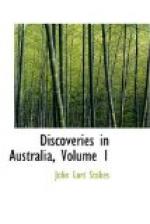OWEN’S ANCHORAGE.
The usual winter anchorage in Cockburn Sound, being seven miles from the town of Fremantle, the colonists were naturally very anxious to see tested the equal security of one which we had chosen within half that distance. The point was fairly tried, and very satisfactorily determined during the heavy weather which we experienced on the 31st of March, and 11th of June, which did not raise more sea than a boat at anchor could have ridden out with safety. These gales lasted about forty-eight hours each, commencing at North by West and gradually blowing themselves out at West-South-West. In each instance a heavy bank of clouds in the north-west gave us a day’s notice of their approach. The indications of the barometer were less decisive; its maximum was 29.3.
The weather in the interval between these gales was wet and unsettled; but afterwards, until our departure, it continued remarkably fine with an average temperature of 60 degrees.
The winds at this season prevail from the land, the seabreezes being both light and very irregular.
ANNIVERSARY OF THE COLONY.
We were just in time to share in the annual festivities with which the inhabitants celebrate the formation of the colony. Horseracing, and many other old English sports showed that the colonists still retain the tastes and habits of home. Some of the aborigines took part in the amusements of the day with evident enjoyment: and we were surprised to find that in throwing the spear they were excelled by an English competitor. We hardly know how to reconcile this fact with our own favourite theories upon the perfection of the savage in the few exercises of skill to which he devotes his attention, and were obliged to take refuge in the inadequate suggestion that the wild man requires a greater degree of excitement than his more civilised competitor, to bring out, or call into action, all the resources of his art. Among the natives assembled were a small party from King George’s Sound: they had come to Perth, bearing despatches from that place. The good understanding which appeared to exist between them and their fellow-countrymen in this district, led me to believe that by bringing different tribes more frequently together, under similar happy auspices to those which convened the meeting of to-day, much might be done to qualify the eager and deadly hatred in which they are too prone to indulge.
The natives in the town of Perth are most notorious beggars: the softer sex ply this easy craft even more indefatigably than the men. Their flattering solicitations and undeniable importunity seldom altogether fail of success, and “quibra (i.e. ship) man,” after the assurance that he is a “very pretty gentleman,” must perforce yield to the solicitation “tickpence give it um me.”
There was one amongst them, who from some accident had lost several of his toes. When in conversation, if he fancied any person was observing his foot, he would immediately endeavour to conceal the part that was thus disfigured by burying it in the sand. Another instance, exemplifying how prevalent is the frailty of vanity in the heart of man in his primitive condition.




